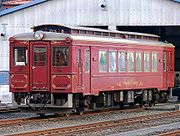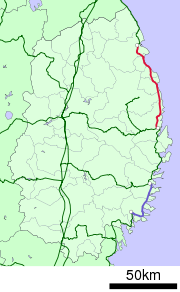
Sanriku Railway
Encyclopedia

Iwate Prefecture
is the second largest prefecture of Japan after Hokkaido. It is located in the Tōhoku region of Honshū island and contains the island's easternmost point. The capital is Morioka. Iwate has the lowest population density of any prefecture outside Hokkaido...
, Japan
Japan
Japan is an island nation in East Asia. Located in the Pacific Ocean, it lies to the east of the Sea of Japan, China, North Korea, South Korea and Russia, stretching from the Sea of Okhotsk in the north to the East China Sea and Taiwan in the south...
. The company or its lines are also known as . The company was founded in 1981, as the first "third sector" (half public, half private
Private railway
A private railroad is a railroad run by a private corporation, as opposed to a railroad run by a public sector.-Japan:In Japan, refers to a railway line owned and operated by private sector. Although Japan Railways Group companies are private entities, they are not considered private railways...
) railway line in the country, excluding special cases such as freight rails in seaport
Port
A port is a location on a coast or shore containing one or more harbors where ships can dock and transfer people or cargo to or from land....
s. Its lines are former Japanese National Railways
Japanese National Railways
, abbreviated or "JNR", was the national railway network of Japan from 1949 to 1987.-History:The term Kokuyū Tetsudō "state-owned railway" originally referred to a network of railway lines operated by nationalized companies under the control of the Railway Institute following the nationalization...
lines, that were going to be closed. Santetsu took these lines in 1984. The company also operates a travel agency and other businesses.
Lines

- Kita-Riasu Line (北リアス線): MiyakoMiyako StationMiyako Station, located in Miyako, Iwate.A station building of Sanriku Railway parts from JR. In addition, the second floor of Sanriku Railway Miyako station becomes the main office of Sanriku railroad.-Line:*JR East**Yamada Line...
— KujiKuji StationKuji Station is the name of two train stations in Japan.# Kuji Station - in Kuji, Iwate Prefecture# Kuji Station - in Kawasaki, Kanagawa Prefecture... - Minami-Riasu Line (南リアス線): SakariSakari StationSakari Station is a train station located on the JR Ōfunato Line in Ōfunato, Iwate, Japan. This station is the largest in Ōfunato City.-Lines:*JR East Ōfunato Line*Sanriku Railway Company South Rias Line...
— KamaishiKamaishi Stationis a railway station located in Kamaishi, Iwate, on the northeastern coast of Japan's main island, Honshū.-Lines:*JR East**Yamada Line**Kamaishi Line*Sanriku Railway**South Rias Line-Adjacent stations:...
2011 earthquake and tsunami damage
Both lines were very badly affected by the 2011 Tōhoku earthquake and tsunami2011 Tōhoku earthquake and tsunami
The 2011 earthquake off the Pacific coast of Tohoku, also known as the 2011 Tohoku earthquake, or the Great East Japan Earthquake, was a magnitude 9.0 undersea megathrust earthquake off the coast of Japan that occurred at 14:46 JST on Friday, 11 March 2011, with the epicenter approximately east...
. The two lines suffered damage at 300 locations, including damage to station buildings and bridges. The tsunami washed away 5.8 km of railway tracks on the lines. Full restoration of service on the lines is expected to be finished in 2014.

